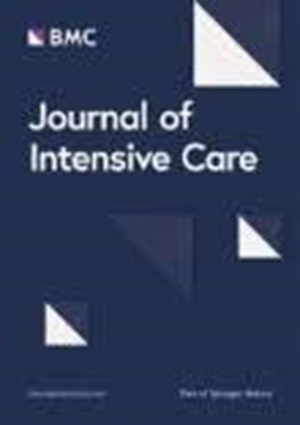Remifentanil vs. dexmedetomidine for cardiac surgery patients with noninvasive ventilation intolerance: a multicenter randomized controlled trial
IF 4.7
2区 医学
Q1 CRITICAL CARE MEDICINE
引用次数: 0
Abstract
The optimal sedative regime for noninvasive ventilation (NIV) intolerance remains uncertain. The present study aimed to assess the efficacy and safety of remifentanil (REM) compared to dexmedetomidine (DEX) in cardiac surgery patients with moderate-to-severe intolerance to NIV. In this multicenter, prospective, single-blind, randomized controlled study, adult cardiac surgery patients with moderate-to-severe intolerance to NIV were enrolled and randomly assigned to be treated with either REM or DEX for sedation. The status of NIV intolerance was evaluated using a four-point NIV intolerance score at different timepoints within a 72-h period. The primary outcome was the mitigation rate of NIV intolerance following sedation. A total of 179 patients were enrolled, with 89 assigned to the REM group and 90 to the DEX group. Baseline characteristics were comparable between the two groups, including NIV intolerance score [3, interquartile range (IQR) 3–3 vs. 3, IQR 3–4, p = 0.180]. The chi-squared test showed that mitigation rate, defined as the proportion of patients who were relieved from their initial intolerance status, was not significant at most timepoints, except for the 15-min timepoint (42% vs. 20%, p = 0.002). However, after considering the time factor, generalized estimating equations showed that the difference was statistically significant, and REM outperformed DEX (odds ratio = 3.31, 95% confidence interval: 1.35–8.12, p = 0.009). Adverse effects, which were not reported in the REM group, were encountered by nine patients in the DEX group, with three instances of bradycardia and six cases of severe hypotension. Secondary outcomes, including NIV failure (5.6% vs. 7.8%, p = 0.564), tracheostomy (1.12% vs. 0%, p = 0.313), ICU LOS (7.7 days, IQR 5.8–12 days vs. 7.0 days, IQR 5–10.6 days, p = 0.219), and in-hospital mortality (1.12% vs. 2.22%, p = 0.567), demonstrated comparability between the two groups. In summary, our study demonstrated no significant difference between REM and DEX in the percentage of patients who achieved mitigation among cardiac surgery patients with moderate-to-severe NIV intolerance. However, after considering the time factor, REM was significantly superior to DEX. Trial registration ClinicalTrials.gov (NCT04734418), registered on January 22, 2021. URL of the trial registry record: https://register.clinicaltrials.gov/prs/app/action/SelectProtocol?sid=S000AM4S&selectaction=Edit&uid=U00038YX&ts=3&cx=eqn1z0 .雷米芬太尼与右美托咪定治疗无创通气不耐受的心脏手术患者:多中心随机对照试验
无创通气(NIV)不耐受的最佳镇静方案仍不确定。本研究旨在评估瑞芬太尼(REM)与右美托咪定(DEX)相比,对无创通气中重度不耐受的心脏手术患者的疗效和安全性。在这项多中心、前瞻性、单盲、随机对照研究中,对 NIV 中度至重度不耐受的成人心脏手术患者被纳入研究,并随机分配接受 REM 或 DEX 镇静治疗。在 72 小时内的不同时间点,使用四点 NIV 不耐受评分来评估 NIV 不耐受状况。主要结果是镇静后呼吸机不耐受的缓解率。共有 179 名患者入选,其中 89 人被分配到 REM 组,90 人被分配到 DEX 组。两组患者的基线特征相当,包括NIV不耐受评分[3,四分位数间距(IQR)3-3 vs. 3,IQR 3-4,p = 0.180]。卡方检验显示,缓解率(定义为从最初的不耐受状态中缓解的患者比例)在大多数时间点均无显著性差异,但 15 分钟时间点除外(42% 对 20%,P = 0.002)。然而,在考虑了时间因素后,广义估计方程显示差异具有统计学意义,且 REM 的效果优于 DEX(几率比 = 3.31,95% 置信区间:1.35-8.12,p = 0.009)。REM组未出现不良反应,而DEX组有9名患者出现了不良反应,其中3例为心动过缓,6例为严重低血压。次要结果包括 NIV 失败(5.6% vs. 7.8%,p = 0.564)、气管切开(1.12% vs. 0%,p = 0.313)、ICU LOS(7.7 天,IQR 5.8-12 天 vs. 7.0 天,IQR 5-10.6 天,p = 0.219)和院内死亡率(1.12% vs. 2.22%,p = 0.567),两组结果具有可比性。总之,我们的研究表明,在中重度 NIV 不耐受的心脏手术患者中,REM 和 DEX 在实现缓解的患者比例上没有显著差异。但是,考虑到时间因素,REM明显优于DEX。试验注册 ClinicalTrials.gov(NCT04734418),注册日期为 2021 年 1 月 22 日。试验登记记录网址:https://register.clinicaltrials.gov/prs/app/action/SelectProtocol?sid=S000AM4S&selectaction=Edit&uid=U00038YX&ts=3&cx=eqn1z0 。
本文章由计算机程序翻译,如有差异,请以英文原文为准。
求助全文
约1分钟内获得全文
求助全文
来源期刊

Journal of Intensive Care
Medicine-Critical Care and Intensive Care Medicine
CiteScore
11.90
自引率
1.40%
发文量
51
审稿时长
15 weeks
期刊介绍:
"Journal of Intensive Care" is an open access journal dedicated to the comprehensive coverage of intensive care medicine, providing a platform for the latest research and clinical insights in this critical field. The journal covers a wide range of topics, including intensive and critical care, trauma and surgical intensive care, pediatric intensive care, acute and emergency medicine, perioperative medicine, resuscitation, infection control, and organ dysfunction.
Recognizing the importance of cultural diversity in healthcare practices, "Journal of Intensive Care" also encourages submissions that explore and discuss the cultural aspects of intensive care, aiming to promote a more inclusive and culturally sensitive approach to patient care. By fostering a global exchange of knowledge and expertise, the journal contributes to the continuous improvement of intensive care practices worldwide.
 求助内容:
求助内容: 应助结果提醒方式:
应助结果提醒方式:


